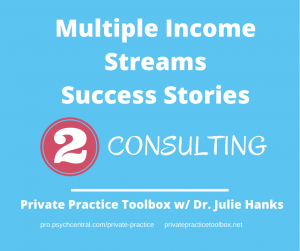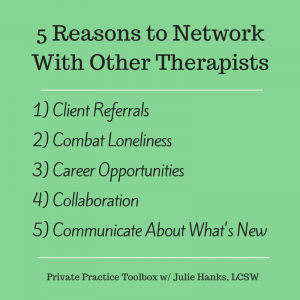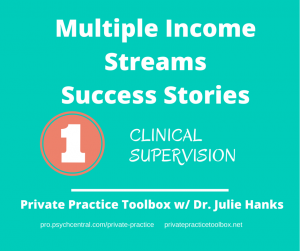As therapists in 2016, we understand that having a functioning, informational, and attractive website isn’t just a good idea-it’s a necessity. But if you’re just starting out in private practice, it can be intimidating to build one from the ground up. How do you design your home page so a user can easily navigate and find what they need? How do you present information in a way that isn’t overwhelming or too “busy”? What’s the best way to make sure your content is mobile-friendly? And even when you figure out the answers to these questions, how do you make the vision in your head actually become reality on a website?
Multiple Income Stream Success Story #2: Consulting
 We are continuing our Success Stories of multiple income streams using the six areas I’ve previously highlighted: supervising, consulting, teaching, publishing, speaking, and writing.
Today we’re looking at number two on this list, Consulting. There are many ways a private practitioner can offer their knowledge for consulting purposes. These include: consulting with professionals, mental health agencies, corporate trainings, media contributing, and forensic consulting.
We are continuing our Success Stories of multiple income streams using the six areas I’ve previously highlighted: supervising, consulting, teaching, publishing, speaking, and writing.
Today we’re looking at number two on this list, Consulting. There are many ways a private practitioner can offer their knowledge for consulting purposes. These include: consulting with professionals, mental health agencies, corporate trainings, media contributing, and forensic consulting.
This success story is my own.
I love helping therapists create a practice that is energizing, fun, and profitable. After I had been in private practice for about 7 years and had grown from a solo to a private clinic, other private practitioners started asking me to share how I developed a clinic that didn’t rely on managed care, how to build a social media presence, and how to land media interviews. I started this blog Private Practice Toolbox on PsychCentral.com in July 2011 and started presenting on practice building strategies and began a consulting business Julie Hanks, LLC.
Here are a few questions to ask yourself if you'd like to add consulting as an additional income stream:
1) In what areas are other mental health professionals asking me for feedback, training, and information?
2) List 3 areas of expertise and professional passions. Which businesses, groups, or individuals people are looking for information related to my specialty area?
3) Which topics are you constantly researching, reading, and talking about simply because you enjoy learning more?
My hope is that these questions prompt you to brainstorm some ways that you could incorporate consulting into your professional life. If you are currently providing consulting, please let me know about it by posting about your consulting services! Feel free to add a link, too.
To learn more about my private practice consulting services visit PrivatePracticeToolbox.net
Get 52 FREE Mental Health Blog Prompts when you sign up for PPT list
5 Reasons to Network With Other Therapists
 As therapists, it’s easy to become isolated. We see our clients, fill out paperwork, perhaps read a book or two to brush up on certain skills, then go home. I certainly don’t mean to imply that the work of a clinical counselor is rote or is not stimulating, but as the nature of therapy is very private, it’s quite possible to get into a routine that greatly limits our interaction with other professionals.
As therapists, it’s easy to become isolated. We see our clients, fill out paperwork, perhaps read a book or two to brush up on certain skills, then go home. I certainly don’t mean to imply that the work of a clinical counselor is rote or is not stimulating, but as the nature of therapy is very private, it’s quite possible to get into a routine that greatly limits our interaction with other professionals.
Through my 13 years in private practice and 20+ years in the mental health field, I have come to understand the power of networking with like-minded professionals. Networking is cultivating relationships to facilitate the exchange of information (which may be related to the nature of the profession and/or to career and employment). For our purposes, it simply means being in frequent and meaningful contact with other therapists! This strategy has greatly benefited my practice and also me personally and professionally in numerous ways.
Here are 5 reasons to get out of your office and begin networking with other therapists:
1) Client Referrals
Perhaps you've recently opened your practice and need to build your clientele. If you know others in the area and have begun to create those relationships, you have a valuable resource to draw upon. Introduce yourself to other practitioners in your area in case they know anyone seeking a therapist with your speciality (it's not self-serving; it's smart). Conversely, if you have a thriving practice and have the wonderful dilemma of having a higher demand for your services than you are able to provide, generously referring out is a way you can serve individuals even though you are not seeing them as clients. Network to learn of others you can contact if/ when this occurs.
2) Combat Loneliness
We teach our clients about the importance of self-care, but are we tending to our own emotional needs as well? We understand from attachment theory that we innately need connection with others; isolation is quite literally a form of torture, and many therapists I've worked with feel a real sense of disconnection seeing only clients all day. Reach out to others in order to fight loneliness and feel emotionally supported (read more here about this idea).
3) Career Opportunities
Beyond your work as a clinician, you can use your skills and talents to serve your community in other ways (such as through writing or consulting), and many of these opportunities present themselves through your relationships with others. Perhaps a colleague has suggested or inspired you to expand your activities. Networking has brought me personally many opportunities that I wouldn't have otherwise had. It's quite amazing the possibilities that can open up to you if you devote time and energy to cultivating those professional connections.
4) Collaboration
Going along with the previous point, finding ways to apply your skills other than by seeing clients is often best done in collaborative efforts. Combining your knowledge and experience with others in the mental health field is a great way to enrich and contribute to the professional community while simultaneously expanding your outreach. This very blog is infinitely more valuable because it contains not only my experiences, but those of others with whom I've networked and created relationships. Reaching out and working with others in the field can enhance your career accomplishments.
5) Communicate About What's New
If you're sitting in your office all day with only minimal contact with the outside world, it's unlikely that you'll hear about new developments in the field. But through continual networking and staying in touch with other clinicians, you can become aware of and familiar with new therapies and strategies that may enhance your practice. Regular contact with others can help you keep abreast of these new ideas, and you as well can offer your feedback on current topics and controversies relating to therapy.
What are reasons YOU network with others?
How has networking benefitted you?
Stay tuned for an upcoming post about therapist-friendly strategies to effectively network.
Visit the new PrivatePracticeToolbox.net for webinars and consulting services
Get 52 FREE Mental Health Blog Topics and prompts when you Sign up for the Private Practice Toolbox Newsletter here.
Join my Private Practice Toolbox Facebook group and connect with 3200 therapists around the globe in 2 simple steps:
1) Click request to join the group and
2) Fill out this brief questionnaire before you’ll be added to the group.
Multiple Income Streams Success Story #1: Supervision
 In the past, I've written about increasing revenue using multiple forms of income (income not related to direct client hours). I offered five key questions to find areas where you might be able to enjoy adding some extra income to your private practice. In this series, I want to share the successes of private practitioners who have used these concepts to find areas that not only increase their income, but help reach their ideal clients and also fuel their passions.
Amy Tatsumi, MA, LPC, found that she could garner additional income and give back to the psychotherapy community by providing supervision to others training in her field. Amy estimates that 25-30% of her income comes from supervision and consultation services.
In the past, I've written about increasing revenue using multiple forms of income (income not related to direct client hours). I offered five key questions to find areas where you might be able to enjoy adding some extra income to your private practice. In this series, I want to share the successes of private practitioners who have used these concepts to find areas that not only increase their income, but help reach their ideal clients and also fuel their passions.
Amy Tatsumi, MA, LPC, found that she could garner additional income and give back to the psychotherapy community by providing supervision to others training in her field. Amy estimates that 25-30% of her income comes from supervision and consultation services.
 “I believe that supervision and consultation are the biggest ways that I can give back as a therapist. Supporting clinicians in their journey to become sound, connected, and grounded psychotherapists has a powerful ripple effect. The supervisee, as well as all of their future clients, are impacted by the supervision process in their growth and development. In my private practice, I offer both individual and group clinical supervision and consultation for post graduate candidates and post license and seasoned practitioners in art therapy, counseling, and psychotherapy.”
“I believe that supervision and consultation are the biggest ways that I can give back as a therapist. Supporting clinicians in their journey to become sound, connected, and grounded psychotherapists has a powerful ripple effect. The supervisee, as well as all of their future clients, are impacted by the supervision process in their growth and development. In my private practice, I offer both individual and group clinical supervision and consultation for post graduate candidates and post license and seasoned practitioners in art therapy, counseling, and psychotherapy.”
To learn more about Amy and her services, visit amytatsumi.com
You might find that the fee you can charge for supervision is similar to your hourly clinical rate. I recommend researching what the standard rates are for supervisors in your area. Be sure that you are meeting all the qualifications for supervising a particular discipline as requirements differ depending on the field (social work, professional counseling, psychology, marriage & family therapy) and on in which state you practice. It is common that supervisors meet requirements for a minimum number of years of licensure or have specialized training as a supervisor. It's also important to research and understand which groups of trainees you should or should not supervise.
Income from supervision can be accomplished in a few ways. I have found in my own practice that hiring interns to meet with clients has been a successful way of creating additional income for the practice. It allows your practice to see more clients than only having one provider. You can also provide direct supervision to clinicians from other agencies. There are many times when clinicians may not have access to the type of supervisor necessary to meet the licensing requirements. They must then seek someone who can provide that. You can also provide supervision for other agencies themselves. Agencies may find that they have a need for someone to supervise employees for similar reasons that clinicians may seed outside supervision. Creating a relationship with an agency for supervision could be a consistent income stream. Consider all your options, then implement the style that works best for you.
If supervision isn't the income source you're looking for, don't worry; I'll be sharing other success stories and ideas for multiple avenues for revenue. I'd love to hear from you about areas where you have found the opportunity to generate income and, hopefully, some excitement for you.
Visit the new PrivatePracticeToolbox.net for webinars and consulting services
FREE Download Get 52 Blog Post Topics & prompts when you sign up for PPT list
Join my Private Practice Toolbox Facebook group and connect with 3200 therapists around the globe in 2 simple steps:
1) Click request to join the group and
2) Fill out this brief questionnaire before you’ll be added to the group.
3 Benefits of Building a Social Media Following
A sizable social media following demonstrates that you are a reliable and respected source.
Once you've set up your social media platforms of choice (Facebook, Twitter, Instagram, etc.), building a group of dedicated followers takes time. Though it may be discouraging to initially only have a few "likes" on your page, consistently creating and curating content and growing your following is a valuable strategy that can pay off. One of the objectives of expanding your readership (gaining more followers on social media) is raising your visibility in the community and attracting more clients. But beyond this, having a loyal audience can help bring you additional professional opportunities. Here's how:
Writing for reputable sites and outlets is one way to secure multiple income streams for yourself. In my own life and career, I am grateful for the opportunity to be a regular contributor for Psych Central and Answers and also to frequently write for other publications. And the reason that I'm able to have these kinds of additional professional experiences is because of my social media following!
Social Proof of Relevance
When I approach a site, I can better convince them to allow me to write for them if I can demonstrate that I have a substantial readership. For example, I point to my 11,500+ Twitter followers and 2,400 followers on Instagram as evidence that I have an audience that cares about the things I say. When I write for a well-known website, I then share that article to my own followers, which increases traffic for both the site and for myself. This symbiotic relationship is possible because I've first built my own social media audience.
Demonstrates Your Expertise
In addition to showing the numbers, having a body of work you can draw from is critical when seeking to expand your professional opportunities. If you only have a few posts on your blog, you haven't yet established yourself as a credible writer. But by regularly creating and repurposing material, you have existing content to prove yourself as a trusted source. Also, your blog and other articles is what you are sharing via your social media platforms. The only way your followers will remain loyal readers is if you are consistently providing them with relevant material.
Attract Professional Opportunities
One unexpected result of building a social media following is that professional opportunities that I want are coming to me. Because I have a large body of online work, an engaged social media following, people who are seeking someone with my expertise can easily find me online. I've also heard several amazing stories of colleagues who have had publishers read out to them and offer a book contract because of their online presence and social media following.
Having a dedicated and engaged social media following is an excellent strategy to securing professional opportunities separate from clinical hours. Your online material can be "liked," re-shared, and re-pinned, and you can show the number of followers you have as evidence that you are a reliable source of information in your field.
What are YOU doing to build your social media following?
Visit the new PrivatePracticeToolbox.net for webinars and consulting services
Get practice tips and blog updates in your inbox. Sign up for the Private Practice Toolbox Newsletter here.
Join my Private Practice Toolbox Facebook group and connect with 3200 therapists around the globe in 2 simple steps:
1) Click request to join the group and
2) Fill out this brief questionnaire before you’ll be added to the group.


As healers, we genuinely like to do our work. Guiding clients through the therapy process and seeing them make progress is why we do what we do. But if you're in private practice, you know there's a lot going on in the back end and that it's crucial to run an efficient and organized business.